Discover the mouthwatering flavors of the South with our Southern Muscadine Jelly recipe. Made from the ripest muscadine grapes, this jelly embodies the essence of Southern hospitality and tradition.
Follow our simple steps to create a delightful spread that captures the sweetness of the region, perfect for enjoying on biscuits, toast, or as a delectable condiment. Let’s dive into this delicious culinary journey.
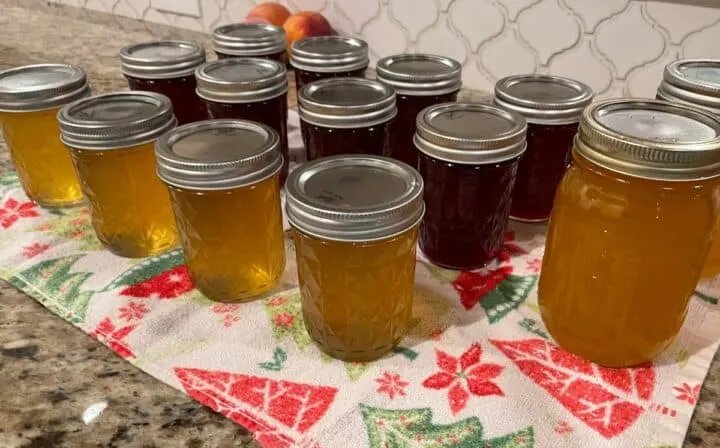
Muscadine Jelly in the Fall
Fall in the South brings forth many traditions with it. Football season starts, hunting season starts, and fall fruit season starts.
Among the fruits are a few favorites, apples in the higher elevations are ripening, persimmon tree fruits are changing from green to purple to bright orange, and muscadines are ripening. One of our favorite things to make is Muscadine Jelly. Today we are going to share our process for How to Make Southern Muscadine Jelly.
Nothing is quite as good as eating a Hot buttered Southern Biscuit with Muscadine Jelly sounds perfect while sipping on hot Wassil. [Super Easy Slow Cooker Wassail Recipe]
Why I Love Muscadine Jelly
In 1984, I was four years old when we first moved to the home place where I grew up. We originally lived about 30 minutes up the road in a different county. Both locations were in my native state of South Carolina.
The new home and homestead we relocated to were built in the early 1900s. There were barns and pastures among fruit trees and bushes. The very first memory I have is a 4-post Muscadine trellis in the corner of the yard with a huge Muscadine Vine growing up it.
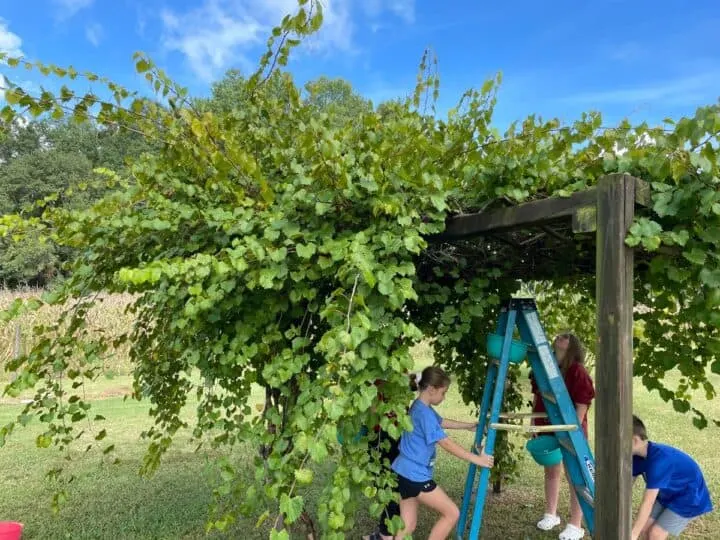
This muscadine vine not only provided lots of fresh fruit and jelly over the years, but it also served as a makeshift clubhouse for an elementary kid growing up in the south. I would climb up one of the posts and sit up there in the weave of the vines on top, staring at the clouds as they passed by.
As you can see, not only do I love the fruit from the vines it produces, but it also has a strong correlation with my memories of growing up in the South. It truly is the fruit of the south. It is on my list of the best Southern foods and Southern Jelly you will taste.
What Is a Muscadine Grape?
If you are not from the southern US, you may be thinking “What the heck is a muscadine?” Muscadine Grapes are a southern wild grape that can be found in the understory forests throughout the south.
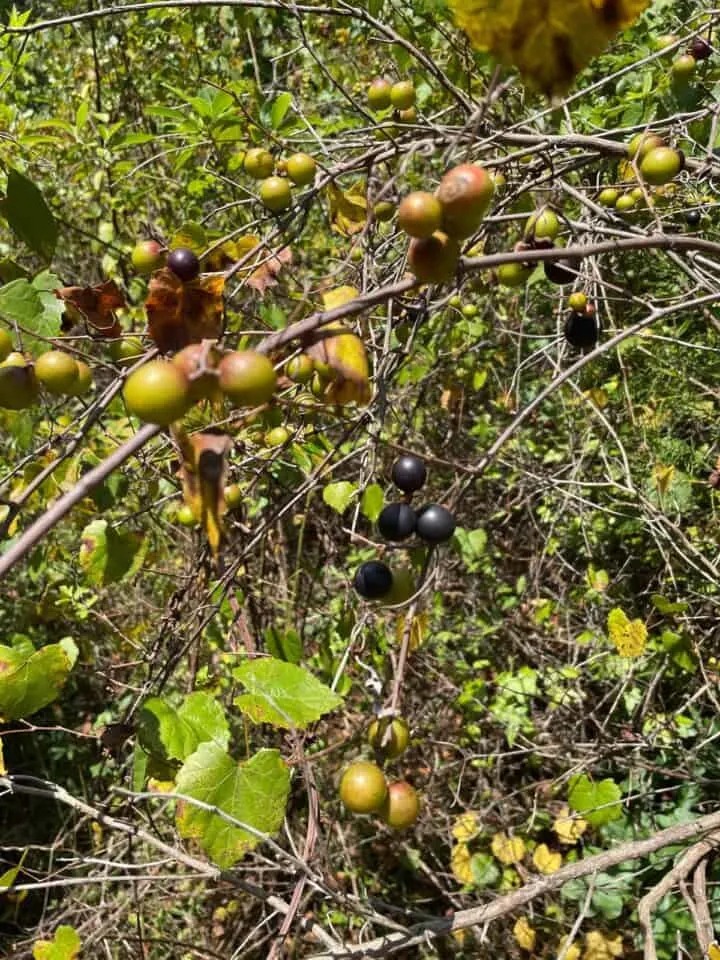
The vines grow up into the tops of trees, and the wild grapes fall to the ground in late summer to throughout the fall. The muscadines thrive in the southern hot and humid environments, something that traditional grapes struggle with. The wild grapes are smaller in size but cultivated varieties tend to be large grapes.
Some people think that the muscadine was the very first cultivated variety and there are many cultivated varieties now to choose from. Homesteads in the South have grown muscadines for many years. You may be hard-pressed to find a homestead without their muscadine vine growing on their property.
There are two colors that you can find them in, Purple and bronze (they range from bronze to a green muscadine). The purple grape can be anywhere from a dark blackish purple (Plum color) to a reddish purple (Magenta). The bronze grape can be green to greenish bronze.
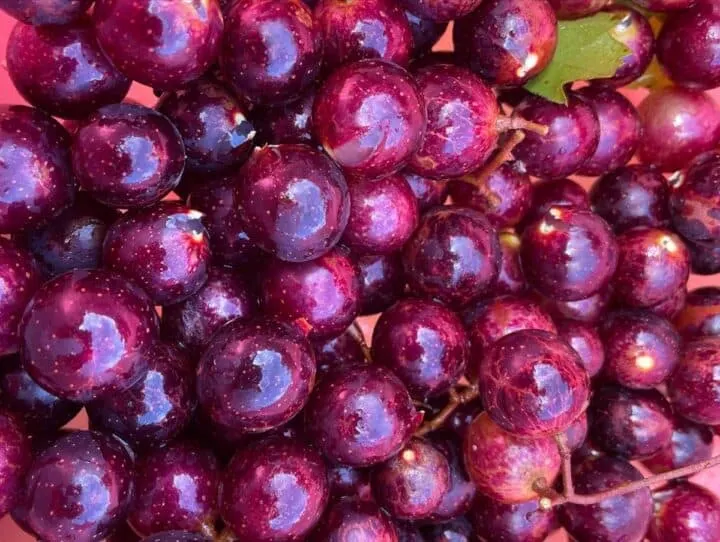
What is Scuppernog Jelly?
Many people get confused when discussing Muscadine grapes with another variety called Scuppernong. Scuppernong grapes are still muscadines but a are cultivated variety of them.
Additionally, there are many other varieties such as Carlos, Noble, Ison, Dixie Red, Fry, Hall, and Pam. The list is much more extensive than this but these are just a few of them.
So to put it simply, Scuppernog Jelly is jelly that is made from the Muscadine juice of the Scuppernog Muscadine Grape.
The University of Georgia has a great research program dedicated to growing new varieties and testing older ones. If you are interested in purchasing vines, check out Ison’s or Bottoms Nurseries.
For more information on the UGA Vineyard, check out my buddy Matt Dean from Dean Family Acres on his recent visit to UGA Tifton GA, Muscadine Vineyard.
What Do They Taste Like?
Muscadines are full of vitamins and nutrients. They are a super fruit in the sense of the word. They all taste similar but depending on the variety, they can have different nuances and sweetness levels.
The first thing to note is the skin. The skin can be thick and tough. Some people bite the grape open and get the pulp out. At that point, they spit out the thick skin.
Some people prefer to eat the skin and all. I personally like the skin but some do not. Furthermore, it is full of all the vitamins and nutrients.
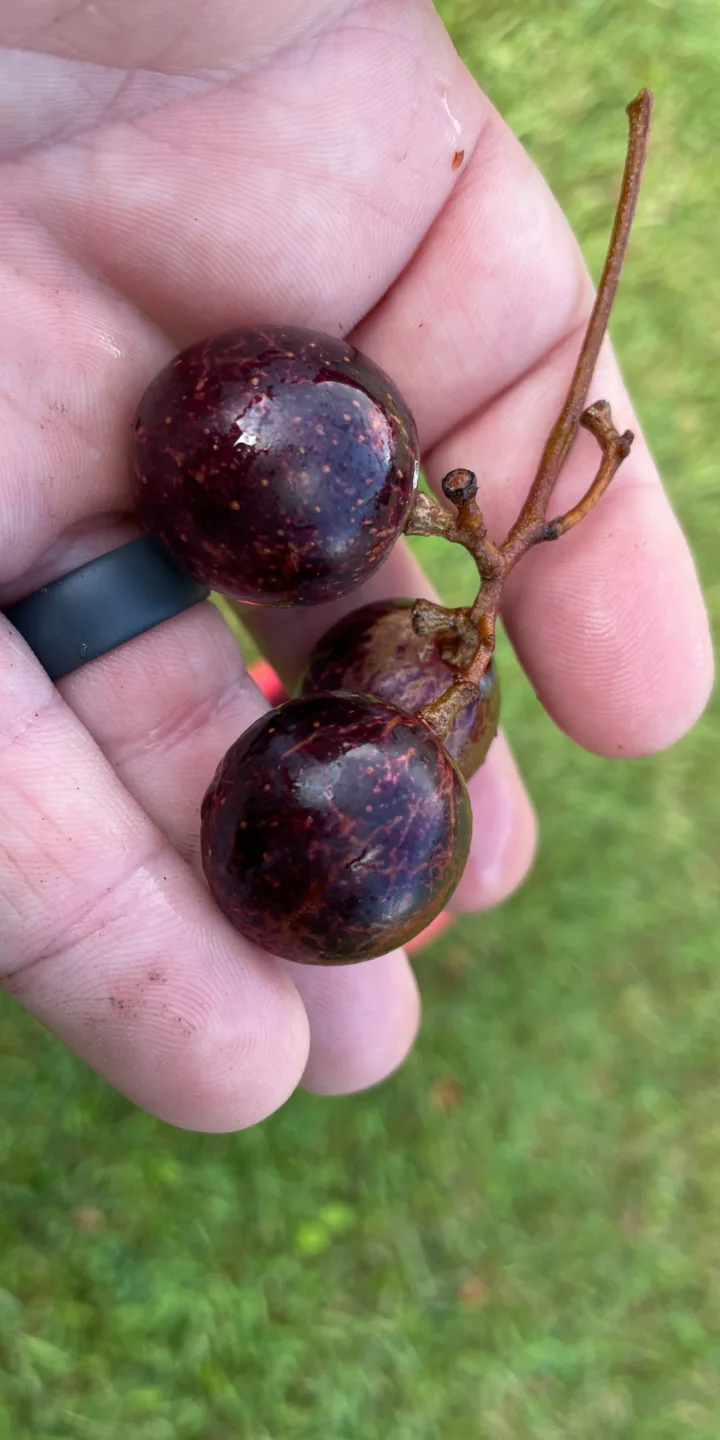
Muscadines do have seeds in them so you may want to spit those out.
Muscadines have a distinct taste and a wonderful smell. Likewise, they have a very intense sweet flavor. They are very sweet with a musky scent. If you have a large bowl full of them, the wonderful smell will fill up your kitchen with a heavenly sweet scent.
If you love canning and making homemade foods, you are going to love this Homemade Crispy Dill Pickle Recipe!
What You Need To Make This Recipe
Ingredients for Muscaind Jelly:
Muscadines– The star of the show is Muscadines. Normally I prefer to keep the purple varieties separate from the bronze, but in this picture, I was lacking enough purple muscadines to make a batch so I added in a few Bronze ones. The results still make a beautiful purple-colored Jelly.
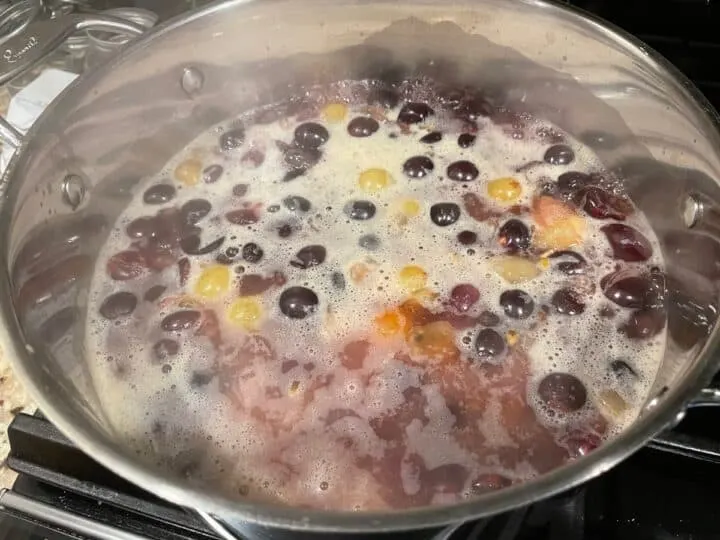
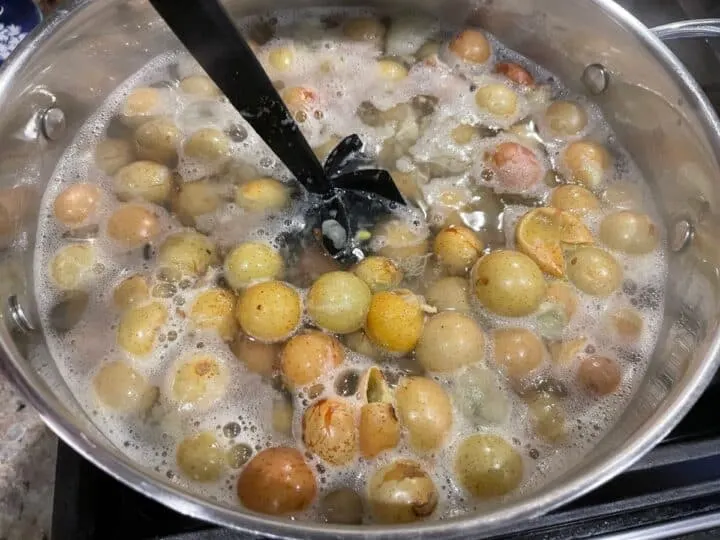
You can see in this picture of me cooking them down how I have them separated. This only affects the color of the juice and is simply a personal preference.
I didn’t have enough purple, so I added some bronze to give me enough juice. You will need roughly five to six pounds of muscadines to yield 5 cups of Muscadine juice.
Sugar-Making Jelly takes a lot of sugar. Do not skimp on the sugar or your recipe will not work out right. You will not have enough liquid to fill the number of jars the recipe calls for. You will need 6 cups of sugar.
Sure Jell-Sure Jell is premium fruit pectin. It contains citric acid in it to help the Jelly or Jam set. Without this, your jelly could turn to liquid and weep.
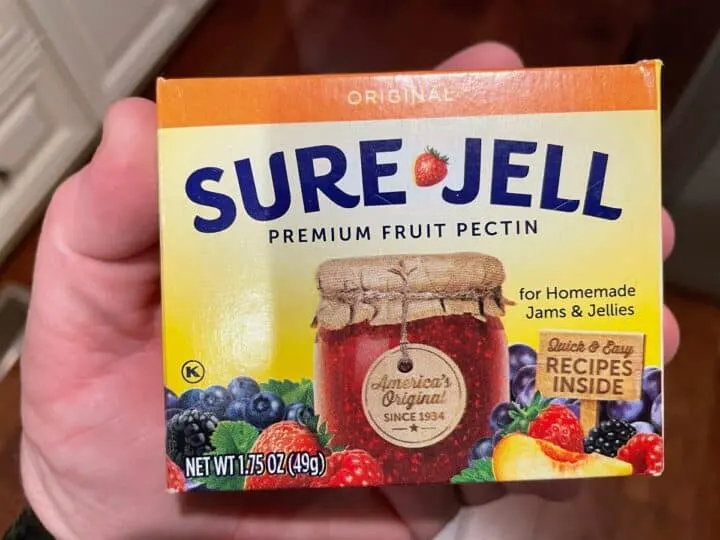
There are other ways to get by without Sure Jell, like using lemon juice, but for this recipe to work out right, you will need Sure Jell. You will need 1 box or Sure Jell. (1.75oz package size)
Butter– I recommend not skipping this ingredient. I have made it with and without it. The benefit of using butter is it keeps the mixture from foaming up.
Once you reach high heat, your fruit juice mixed with the sugar will want to explode in foam. Adding a teaspoon of butter will prevent this from happening. You will need one teaspoon of butter.
Note: See the recipe card at the bottom of the post for quantities
Equipment You Will Need to Make Muscadine Jelly
- 3 Piece Strainer set. You can also use a wire colander, cloth jelly bag, or even cheesecloth
- Instant Read Thermometer or Candy Thermometer
- Large Pot, Large Stockpot, or Large Saucepan
- Small Pot or Stock Pot
- 8 Half-Pint Jars (8 oz Jars) with Screw Rings and Lids
Note: For a full list of items and brands that I recommend for canning and preserving, check out our page dedicated to it. [Canning and Preserving].
How To Make Muscadine Jelly
Step-by-step Instructions
Sterilizing the Jars
Step 1: Fill your water bath canner up with water and place it on the stove. Turn the burner to high heat and begin to heat the water. Next, before you begin any canning job or recipe wash the jars. Even if they are brand new out of the package, I like to wash them first along with the rings and lids.
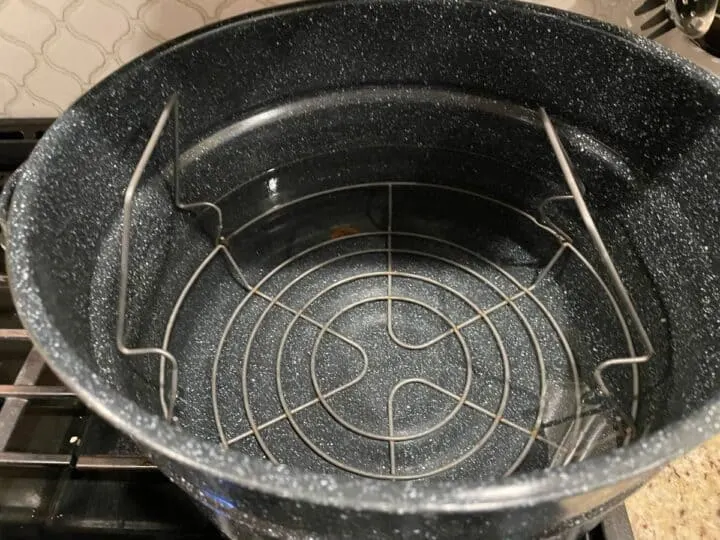
Step 2: Place the jars into the water bath canner. Make sure you have the wire rack in the canner. You can raise the wire rack to set the jars on it, then lower it down into the water. This step is to sterilize the jars.
Step 3: Grab a small stock pot or saucepan and fill it halfway up with water. Place the lids and rings into the pot and put them on the stove. I usually put this on low heat. This is to sterilize the lids and rings, but also it helps the lids seal once you go to use them. I leave this on the heat the whole time while canning until I am ready to use them.
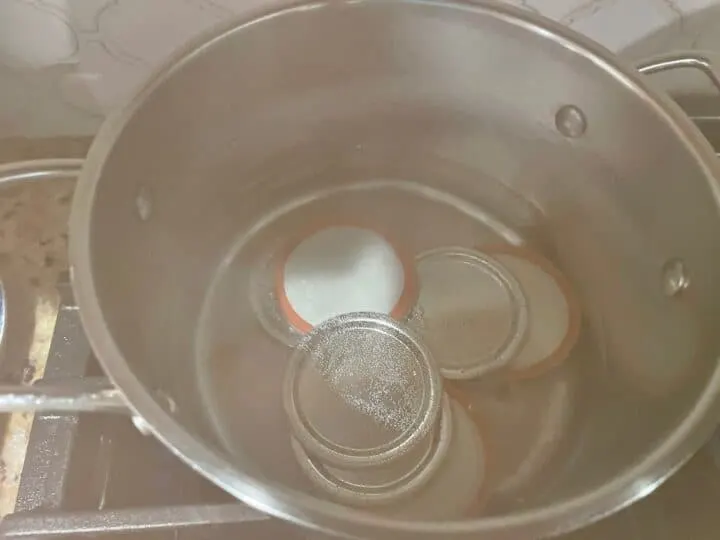
Making The Muscadine Juice
Step 1: Wash and sort the muscadine grapes, taking out any bad ones.
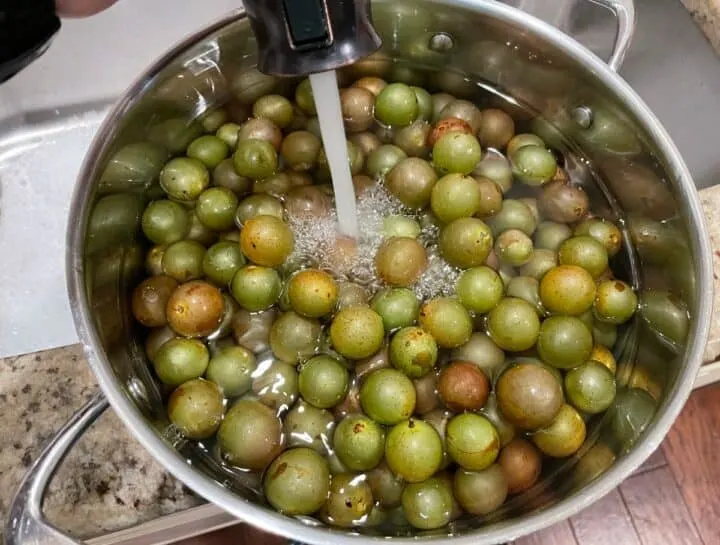
Step 2: Grab a large stock pot and put the muscadine grapes in the pot. Fill with water up to the grapes. You want to have just enough water to cover the grapes.
Step 3: Cook the grapes on medium-low heat. Some recipes call to cook for only 15 minutes, but I like to cook mine longer. I will cook for thirty to forty-five minutes.
I like to cook it a little longer as it brings out more color from the skins of the grape making a very beautiful-looking jelly. While the grapes are cooking, use a potato masher to smash the grapes.
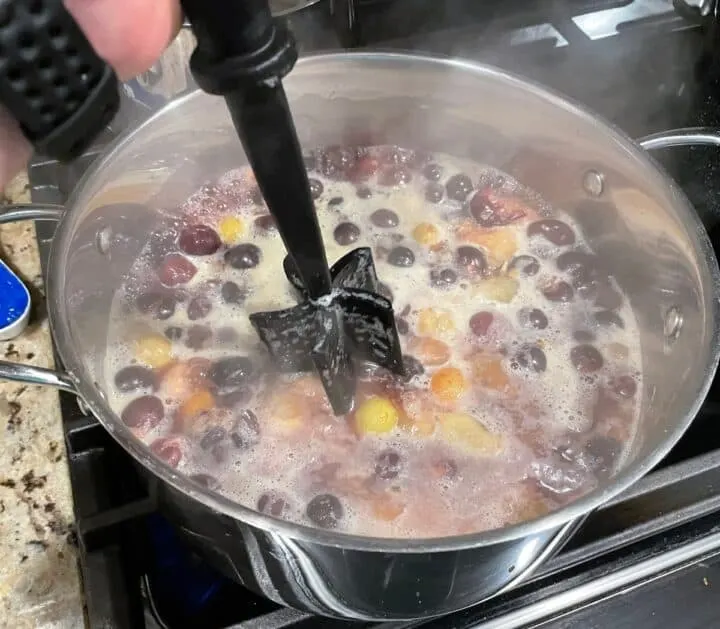
Step 4: After the grapes have cooked, the next thing to do is to strain them to remove the juice from the skin and remove the seeds. I use a food strainer that has a pestle with it.
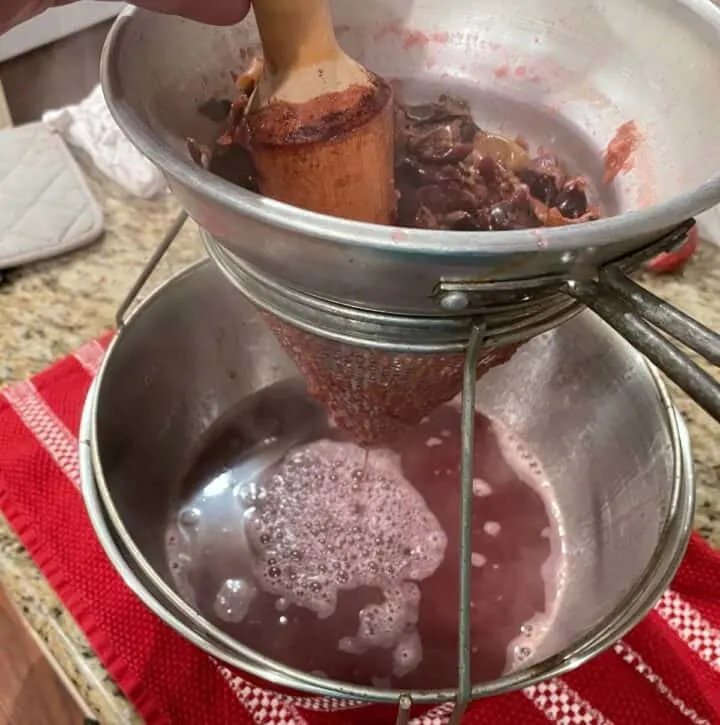
You can work the pestle around and it squeezes the juice and pulp out. If you do not have this, you can use a wire colander, a food strainer, or even a cheesecloth. You will just have to press and squeeze the grapes to get the juice out.
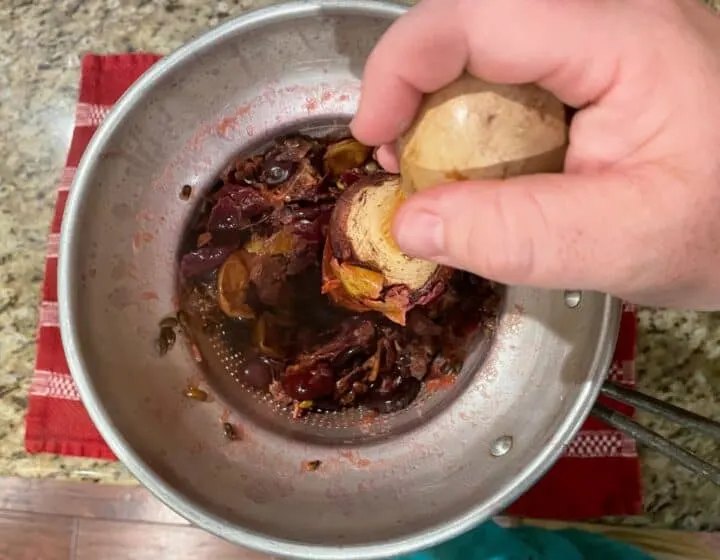
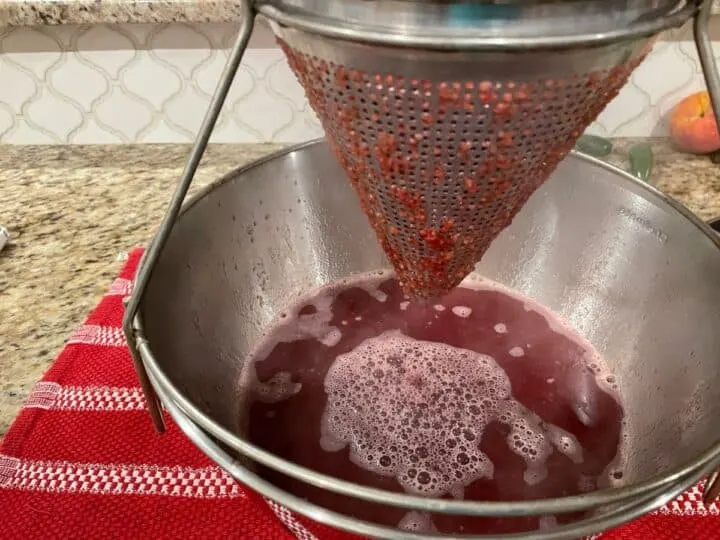
Making The Muscadine Jelly
Step 1: Measure out five cups of juice and add the juice to a large stock pot. Bring to a full rolling boil. It should be boiling so much that it does not stop when it is stirred with a spoon.
Step 2: Add in the full box of pectin and stir until dissolved. Then add in the butter.
Step 3: Bring the mixture back up to a rolling boil for one minute then slowly stir in the six cups of sugar. Stir the mixture until the sugar is dissolved.
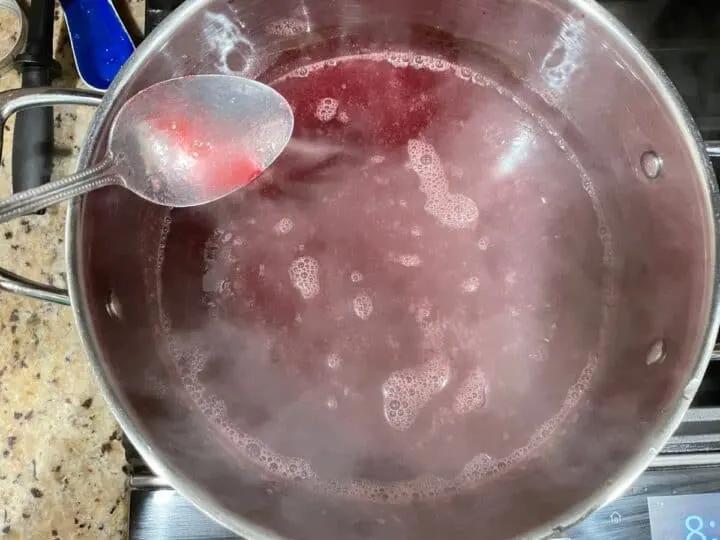
Step 4: At this point, you can test the mixture to see if it is ready to pour into the jars by dipping the back of a spoon into the mixture. The mixture should “sheet” from the spoon and not drip. If not, you will need to add in more pectin.
Canning The Muscadine Jelly
Step 5: Remove your hot jars from the hot water bath and set them on a dry towel or sheet pan. Fill each jar up with hot jelly mixture using the funnel from the 3-piece canning set.
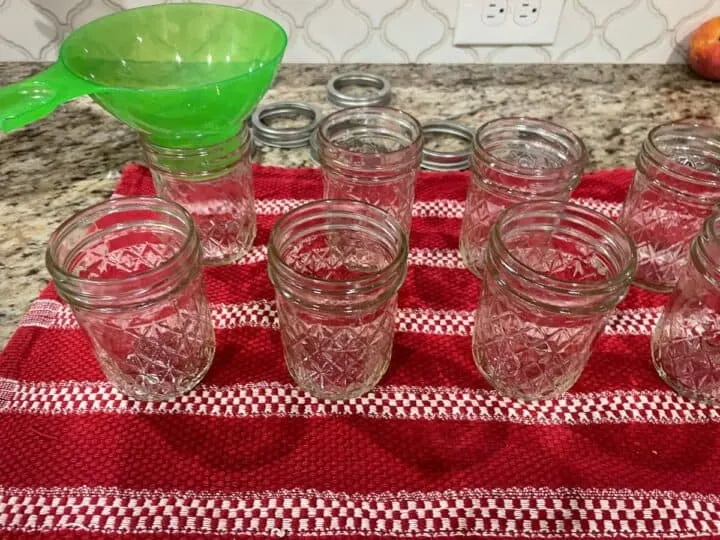
Next, you will set the headspace of the jars by using the headspace tool to measure. You want to leave ¼ inch of headspace.
Step 6: Using a damp cloth, wipe the rims of the hot jars down carefully. Next using the lid tool from the 3-piece canning set, dip the magnet end of the tool into the water where you have the metal lids. Remove a lid and a screw ring. Place the lid on each jar and put a screw ring on it. You only need to hand-tighten the ring.
Step 7: Use the Jar lifter to place each jar back into the water bath canner. Make sure you have at least one inch of water above the jars once they are let down into the water. Bring the water up to a rolling boil.
You will run the Muscadine Jelly in the water bath canner for 10 minutes after it has come up to a rolling boil. If you live in a high-elevation area the time will change. Make sure to check the Ball canning guide or the Sure Jell instructions for the correct time.
Step 8: After the time is up, remove the jars from the water bath canner and place jars on a cooling rack or a tea towel to cool off. This is when you will hear the most glorious sound your ears have ever heard, canning jar lids popping!

Pro Tip: Make sure not to double the batches as this can make it not jell or turn out right. Once the jelly has cooled off to room temperature, check to make sure it has set. This could take until the next day.
If the homemade jelly has set, you are good to eat it. If it has not been set, you can redo it but dumping back into a pot and adding in more pectin, then repeating the water bath canning steps.
Conclusion
In conclusion, crafting your own Southern Muscadine Jelly is a rewarding experience that allows you to savor the taste of the South all year round. Whether you’re spreading it on warm biscuits for a comforting breakfast or gifting jars to friends and family, this homemade delicacy brings a touch of Southern charm to any table.
With its vibrant flavor and the joy it brings, this jelly embodies the heart and soul of Southern cuisine. So, whip up a batch, share the love, and relish in the rich tradition of Southern hospitality one delightful spoonful at a time.
FAQ’s
What is Muscadine Jelly?
Muscadine Jelly is the Jelly made from the fruit juice of Muscadine Grapes. Muscadine Grapes are a Grape that grows wild in the Southern US but many cultivated varites offer bigger sizes, better taste, and sweeter fruit.
Do I Have To Use One Variety of Muscadines?
You can mix and match if you want. I prefer to keep them separate for the color aspect of the finished product.
How Can I Store The Fresh Muscadines Before I am Ready to Make My Jelly?
You can store the fresh muscadines in a separate bowl. Place them in a cool dark place but try to use them quickly as they will ripen and then spoil in a few short days. You could also place them in the refrigerator to extend their freshness.
Can I Use Pint Jars Instead?
Yes, you can use Pint Jars instead. Pint Jars will make half as much (four jars instead of 8).
Can I Use Muscadine Grapes From The Grocery Store or Farmers Markets?
Yes, you can use Muscadines that are wild, from the grocery store, from your farmer’s markets, etc.
Is This Muscadine Jelly Recipe The Same as the Scuppernong Jelly Recipe?
Yes, Sucppernogs are a variety of Muscadines the same way a yellow delicious is a variety of apples.
Can I Double My Batches?
I would recommend against double the batch. This can make the Jelly not jell right.
How long does homemade Southern Muscadine Jelly last?
When properly canned and stored in a cool, dark place, homemade muscadine jelly can last up to a year or even longer. Once opened, it should be refrigerated and used within a few weeks.
Can I reduce the sugar content in Muscadine Jelly?
Sugar plays a critical role in jelly-making, helping to set the jelly and preserve it. However, there are low-sugar or no-sugar pectins available if you want to reduce the sugar content while maintaining the jelly’s texture and flavor.
Thanks for checking out our blog. We truly hope that you found value in it. If you did, please consider sharing our post. It helps to spread our content. Also, don’t forget, “Let’s Get Food Junked!”
-Ronnie | Let’s Get Food Junked
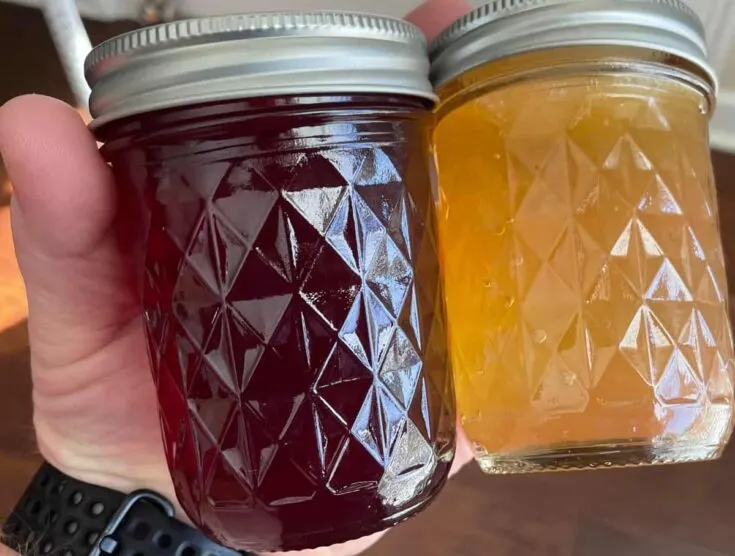
How To Make Southern Muscadine Jelly
Fall in the South brings forth many traditions with it. Football season starts, hunting season starts, and fall fruit season starts. Among the fruits are a few favorites, apples in the higher elevations are ripening, persimmon tree fruits are changing from green to purple to bright orange, and muscadines are ripening. One of our favorite things to make is Muscadine Jelly. Today we are going to share our process for How to Make Southern Muscadine Jelly.
Ingredients
- Ingredients for Making The Muscadine Juice
- 5-6 Pounds Muscadine Grapes
- 5 cups of water or enough to cover the grapes
Making The Jelly
- 5 cups Muscadine Juice
- 6 cups granulated sugar
- 1 box Sure Jell (1.75oz package)
- 1 teaspoon butter
Instructions
Sterilizing the Jars
- Step 1: Fill your water bath canner up with water and place it on the stove. Turn the burner to high heat and begin to heat the water up. Next, before you begin any canning job or recipe wash the jars. Even if they are brand new out of the package, I like to wash them first along with the rings and lids.
- Step 2: Place the jars into the water bath canner. Make sure you have the wire rack in the canner. You can raise the wire rack to set the jars on it, then lower it down into the water. This step is to sterilize the jars.
- Step 3: Grab a small stock pot or saucepan and fill halfway up with water. Place the lids and rings into the pot and put them on the stove. I usually put this on low heat. This is to sterilize the lids and rings, but also it helps the lids seal once you go to use them. I leave this on the heat the whole time while canning until I am ready to use them.
Making Muscadine Juice
- Step 1: Wash and sort the muscadine grapes, taking out any bad ones.
- Step 2: Grab a large stock pot and put the muscadine grapes in the pot. Fill with water up to the grapes. You will need just enough water to cover the grapes.
- Step 3: Cook the grapes on medium-low heat. Some recipes call to cook for only 15 minutes, but I like to cook mine longer. I will cook for thirty to forty-five minutes.
- I like to cook a little longer as it brings out more color from the skins of the grape making a very beautiful-looking jelly. While the grapes are cooking, use a potato masher to smash the grapes.
- Step 4: After the grapes have cooked, the next thing to do is to strain them to remove the juice from the skin and remove the seeds. I use a food strainer that has a pestle with it. You can work the pestle around and it squeezes the juice and pulp out. If you do not have this, you can use a wire colander, a food strainer, or even a cheesecloth. You will just have to press and squeeze the grapes to get the juice out.
Making The Muscadine Jelly
- Step 1: Measure out five cups of juice and add it to a large stock pot. Bring to a full rolling boil. It should be boiling so much that it does not stop when it is stirred with a spoon.
- Step 2: Add in the full box of pectin and stir until dissolved. Then add in the butter.
- Step 3: Bring the mixture back up to a rolling boil for one minute then slowly stir in the six cups of sugar. Stir the mixture until the sugar is dissolved.
- Step 4: At this point, you can test the mixture to see if it is ready to pour into the jars by dipping the back of a spoon into the mixture. The mixture should “sheet” from the spoon and not drip. If not, you will need to add in more pectin.
- Step 5: Remove your hot jars from the hot water bath and set them on a dry towel or sheet pan. Fill each jar up with hot jelly mixture using the funnel from the 3-piece canning set.
- Next, you will set the headspace with the headspace tool. You want to leave ¼ inch of headspace.
- Step 6: Using a damp cloth, wipe rims of the hot jars down carefully. Next using the lid tool from the 3-piece canning set, dip the magnet end of the tool into the water where you have the metal lids. Remove a lid and a screw ring. Place the lid on each jar and put a screw ring on it. You will just hand tighten it.
- Step 7: Use the Jar lifter to place each jar back into the water bath canner. Make sure you have at least one inch of water above the jars once they are left down into the water. Bring the water up to a rolling boil.
- You will run the Muscadine Jelly in the water bath canner for 10 minutes after it has come up to a rolling boil. If you live in a high elevation area the time will change. Make sure to check the Ball canning guide or the Sure Jell instructions for the correct time.
- Step 8: After the time is up, remove the jars from the water bath canner and place jars on a cooling rack or a tea towel to cool off. This is when you will hear the most glorious sound your ears have ever heard, canning jar lids popping!
Notes
Pro Tip: Make sure not to double the batches as this can make it not jell or turn out right. Once the jelly has cooled off to room temperature, check to make sure it has set. This could take until the next day.
If the homemade jelly has set, you are good to eat it. If it has not been set, you can redo it but dumping back into a pot and adding in more pectin, then repeating the water bath canning steps.
Nutrition Information:
Serving Size:
1 gramsAmount Per Serving: Unsaturated Fat: 0g
While you are here, check out some of these other recipes:

Karla
Tuesday 17th of October 2023
Hello, thank you so much for the recipe for Southern Muscadine Jelly. I've made three batches from our grapes and it turned out so well. I've never made muscadine jelly before and it tastes and looks great. Giving some pints for Christmas.
Ronnie Williams
Wednesday 18th of October 2023
Good morning Karla, I am so glad that your Muscadine Jelly turned out so great. Thanks so much for your comment. I truly appreciate it. Thanks in advance, -Ronnie | Let's Get Food Junked
Ellie
Friday 6th of October 2023
Great recipe, worst website I’ve ever had the displeasure of using. The jelly turned out lovely and we received lots of compliments from the friends we shared it with. The butter helps the flavor and reducing foaming. It’s a great addition. Definitely will use this recipe next year. However I’m going to write it down so I never have to use this godforsaken webpage again. Trying to read the steps and having ads popping up over the text made me want to throw the jars out the window. Even after jumping to the recipe I constantly had to close ads. The website blocks you from using reader mode. Write the whole recipe down and immediately close the window or else drive yourself to the brink of insanity.
Becky Smart
Sunday 15th of October 2023
@Ronnie Williams, so very well said! No matter what your page content is you're going to have annoying pop-up ads, not x them out properly is the pain. I've learned to just screen shot my pages to get thru faster. I store recepies in a separate file anyways. I've lots of Muscadines this fall season!
Ronnie Williams
Monday 9th of October 2023
Good morning Ellie, Thanks for sharing your comments with us. I am thrilled you loved the jelly recipe and all your friends did as well. It is one of my favorites to make and eat. I am sorry you had issues with the website. I am fairly new to having the ads on here and I want to create the best user experience for the ones that want to view my recipes but at the same time, the ads are what pay the bills. I provide the recipes as a free service to people and in turn, the ads pays me for my time spent and money spent. The website cost money to have online. It takes time to research what recipe to write and at what time to write it. It takes time to develop the recipe, write it down and edit the recipe, take pictures, edit pictures, etc. It usually takes around 30 to 40 hours of my personal time just to make one recipe on my site. The website cost and the recipes cost money. I have the cost of the recipe ingredients, hosting of the website, related software I use for SEO research etc. It can be quite expensive. I have also bought props to use, cameras, lens, all for the sake of the website and to provide the free content for viewers such as you. This is a business for me and the ads make it worthwhile to share my recipes with the world and keep the lights on and make it free for viewers. It is the same with watching tv, or YouTube. You watch the ads and that is what pays their bills. As far as the recipe and the ads goes, if you hit jump to the recipe, then there is a option where you can print the recipe off and not have to write it down. That way you will not have to look at the ads. Even if you do not wish to print it, by hitting the print selection, it will pop up the whole recipe in a new screen with no ads and you can look or view it there. Again I apologize for the inconvenience. Thanks in advance, -Ronnie
Melody
Thursday 5th of October 2023
Are wild muscadine not usually sweet? I have some and would like to make jelly but they’re pretty tart! Should I add more sugar?
Ronnie Williams
Monday 9th of October 2023
Good morning Melody, Wild muscadines can be hit or miss. You can defiantly use the wild ones as the recipe uses quite a bit of sugar. You are basically getting the flavor from the wild ones. When you grow or buy cultivated variety, they are breed for certain characteristics such as sweetness, thinner skin, less seeds, bigger fruit production etc. Either way, I think you should try it with the wild ones as I think they will be fine. Thanks in advance, -Ronnie | Let's Get Food Junked!
Dianne
Thursday 5th of October 2023
Ronnie I used this recipe to make my first batch of Muscadine jelly. I now have 5 (5cup) containers in my refrigerator and I am looking for a recipe. I ended up using 3 boxes of sure jell and still have syrup I am so disappointed 😔.
Dianne
Thursday 5th of October 2023
@Ronnie Williams, that is juice for future use!! this recipe was 5 cups juice, 6 cups sugar and ended up 3 boxes sure gel guess it is 6 half pints of syrup!!!!
Ronnie Williams
Thursday 5th of October 2023
Good morning Dianne, I am not understanding. Did you have 5 cups of juice leftover? Why did you use 3 boxes of sure jell also? You should only need one to make this recipe. Thanks, -Ronnie
Sarah Powell
Sunday 1st of October 2023
Hi I made your recipe and it turned out great. I had two batches , but I had enough juice for at least one more. I’m done for the day! Thank you for your time and effort in publishing your recipes. I’m going to be making some of them.
Ronnie Williams
Monday 2nd of October 2023
Good morning Sarah, That is so awesome. I am glad you enjoyed it. Keep looking for more recipes! Thanks, -Ronnie